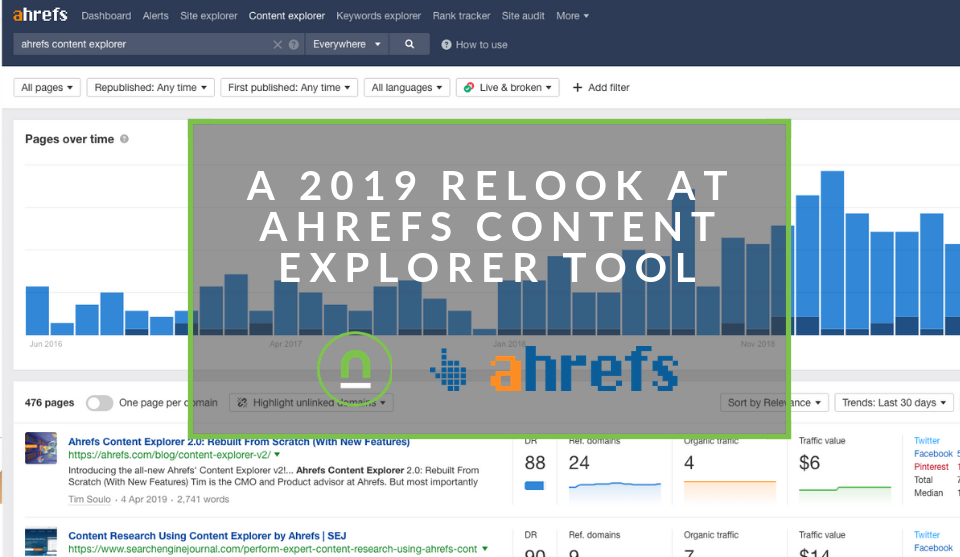Recent posts

Money Talks
Everything You Need to Know About SASSA Status Check
13 April 2025

Mind, Body & Soul
The Genetic Diversity of Cannabis Seeds
12 April 2025

Money Talks
How Small Businesses Can Leverage Blockchain Technology
02 April 2025

Industry Experts
Mastering Personalization in Digital Marketing
31 March 2025
Popular posts
Extravaganza
Trending Music Hashtags To Get Your Posts Noticed
24 August 2018
Geek Chic
How To Fix iPhone/iPad Only Charging In Certain Positions
05 July 2020
Extravaganza
Trending Wedding Hashtags To Get Your Posts Noticed
18 September 2018
Money Talks
How To Find Coupons & Vouchers Online In South Africa
28 March 2019
A 2019 Relook At Ahrefs Content Explorer Tool
22 August 2019 | 0 comments | Posted by Che Kohler in nichemarket Advice
Content marketing is a bit of a misnomer since its seen by many an umbrella term for blogging, which isn't exactly the case. Content marketing encompasses all content marketing efforts. Some content is amplified and used by direct channels like email, while other content is better suited for social media.
While the holy grail is creating performance content that not only generates traffic and leads but does so consistently. This performance-based content marketing is where many of the elite SEO's and content marketers cut their teeth.
It is a highly competitive field where ranking for certain keywords can be worth millions to a specific site. Which is why marketing teams and agencies are always looking to get the edge over one another by any means necessary.
Creating content that actually works
While writing new posts on your company blog doesn’t seem like rocket science, and anyone can do it, creating content that performs is where it starts to get complicated. The lack of returns is often why small businesses avoid content marketing and why larger companies have started to have dedicated content marketers or content marketing teams.
When you're trying to create content to measure the ROI, preparation is the key to success. The more research you have the better your chances are of hitting the nail on the head, or getting close enough that you can refine it over time.
Keyword research vs content research
If you've been in the content marketing and SEO sphere for more than 5 minutes you would probably have heard of the term keyword research. Where we review the various terms users input into search engines around a specific product and service and then try to reverse engineer content out of the various keywords and intents we see coming from search engine queries.
While keyword research offers us a great platform from which to extract valuable information, its only one piece of the puzzle and many content marketers and SEO's forget about using content research as an additional layer.
What is content research?
If you're going to start content marketing chances are you already have some competition and depending on the popularity of the keyword it can be hard to hit page one and compete with the top 10 serach results. Content research takes a look at what ar the various pages/URLs being returned for several queries you are interested in and review of the source material.
Using Ahrefs rebuilt "Content Explorer" tool
Content Explorer has been around for some time, around five years now and I never paid it much attention but as of 2019, it has been rebuilt with some nifty features which made me take note.
I've recently started to use Content Explorer by Ahrefs to do my content research and I have to say while not a perfect tool it does provide you with some pretty useful insights that any content marketer worth their weight in words would find useful.
First of all, it's pretty easy:
- All you need to do is login
- Select content explorer form the main navigation above
- Add keywords you're interested in ranking for and click search
You will then be taken to a search result page that provides you with the top-performing content (mind you not always relevant to you depending on the keyword and its various interpretations).
Once your results have loaded you can review the following metrics:
Pages over time
Shows you how many pages were published using these keywords and when they were published. Which can give you an idea of how dated the content has become and if it's due for an upgrade.
Domain-specific
Depending on your keyword and the content efforts of a competitor, your results may return several pages from one domain. You can then set it only to show you the best performing page per domain, so you get a better spread of competitor sites you'll be going up against.
Traffic value
Content explorer gives you an estimate of how valuable the traffic is based on paid search bidding for that keyword and the amount of traffic that specific URL receives from search engines. Which makes for a great way to estimate the ROI of your content marketing efforts should you need to motivate to stakeholders for buy-in.
Organic traffic
The tool also gives you a traffic estimate over a specific period. You can use these metrics to see how effective this piece of content has been over time and if it's still holding on to a reasonable amount of evergreen traffic.
Domain rank
Domain rank is a proprietary metric that measures a sites ranking ability, so you know what you're up against when trying to compete. You can use domain rank compare the ranking ability of your site to the ranking ability of those currently dominating SERPs.
Social impact
A break down of how many shares a post has received from Facebook, Twitter and Instagram. (Note this can be affected by the specific sites ability to pay for content to be promoted on social sites and thus amplify those numbers). Which gives you an idea of how popular that piece fo content was with social media audiences and if it is worth promoting on these platforms.
Backlinks
Backlinks give you a comprehensive list of which sites link to the particular article in question, their domain rank and when it was first linked. The backlink report is one of my favourite features as it helps me build a source of links I can then contact later for outreach purposes.
Organic keywords
A list of organic keywords that this URL receives impressions and possible clicks for from SERPs. The organic keyword data gives you an idea of what keywords work for that specific piece of content and which long-tail or semantic keywords may be missing (based on your keyword research) that could be included in your piece to make it a more comprehensive article.
Anchor text used
A look at the type of anchor text used, how many pages are linking back to this page and if they are "do follow" or not. The anchor text data gives you an idea of how you can better optimise anchors text when doing your outreach and link building. Having better optimised external anchor text can make all the difference when margins with competing articles are tight.
Twitter accounts who retweeted
Content Explorer also provides you with a list of Twitter accounts that have retweeted a specific article which is awesome for amplification later down the line. Once you've created your piece of content, you now have a ready-made list of possible accounts you can @ on Twitter or contact directly to promote your content.
Export your data
Best of all if you like creating reports be it manually or with Google Data Studios you can do a quick export and start manipulating and excluding the data to only show you or your client what is relevant.
Rethinking research for content marketing
Content marketing doesn't have to be a "nice to have" when you work strategically and formulate content strategies based on many key factors. Instead of blindly guessing you can now get a glimpse into what content works for certain audiences and how it works, which gives you an idea of how to build content that can gain traction over time.
Tell us your content marketing story
Have you been frustrated with returns content marketing? How have you been using content marketing? Share it with us in the comments section down below.
Contact us
If you would like us to set up your content marketing strategy or want to know more about digital marketing for your business, then don’t be shy we’re happy to assist. Simply contact us
Are you looking to promote your business?
South African Business owners can create your free business listing on nichemarket. The more information you provide about your business, the easier it will be for your customers to find you online. Registering with nichemarket is easy; all you will need to do is head over to our sign up form and follow the instructions.
If you require a more detailed guide on how to create your profile or your listing, then we highly recommend you check out the following articles.
Recommended reading
If you enjoyed this post and have a little extra time to dive deeper down the rabbit hole, why not check out the following posts on business blogs.
- 10 Sites Bloggers Can Use For Self Syndication
- How To Use Demarketing To Drive More Leads From Your Blog
- 10 Tips That Will Set You Apart From Other Bloggers Online
- Content Marketing Is Shifting From Egocentric To Customer-Centric
- How To Create A Company Culture of Content Marketing
Tags: SEO, Content Marketing, Digital Marketing, Product Review
You might also like
The Genetic Diversity of Cannabis Seeds
12 April 2025
Posted by Alina Jones in Mind, Body & Soul
A look into the South African heritage of cannabis growing and how the country has taken the plant in terms of growing it into a viable industry & th...
Read moreThe Role of Customer Service in Selecting a Forex Broker
29 March 2025
Posted by Cornelia Ekong in Money Talks
Discover why excellent customer service is crucial when choosing a Forex broker, and learn how to evaluate support quality before committing your cap...
Read more{{comment.sUserName}}
{{comment.iDayLastEdit}} day ago
{{comment.iDayLastEdit}} days ago
 {{blogcategory.sCategoryName}}
{{blogcategory.sCategoryName}}

